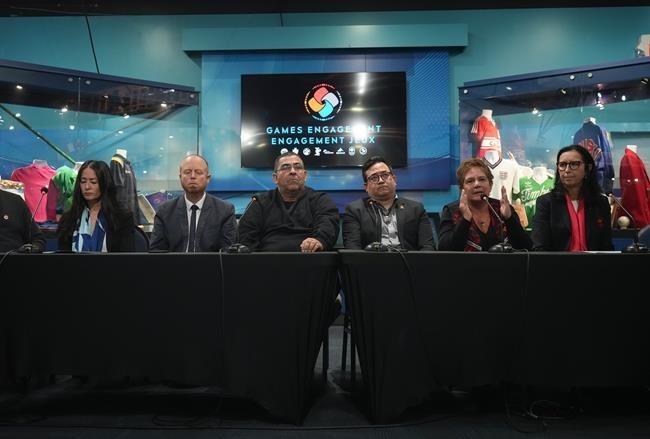VANCOUVER — First Nations leaders say they're still open to pursuing a bid to host the 2030 Olympics in British Columbia, but need the provincial government to engage in talks for plans to move forward.
At issue is not just the future of the Games, but the future of reconciliation in the province, said councillor Wilson Williams of the Squamish Nation.
“Our canoe is stalled right now," he told reporters Friday. "Truly, if we don’t get the provincial or federal government in the canoe, we are still here. We aren’t going anywhere. And the power of us working together, it’s not going away.”
B.C. Minister of Tourism, Arts and Culture Lisa Beare announced Thursday that the provincial government won't support the Indigenous-led bid to host the 2030 Games in Vancouver, Whistler and Sun Peaks.
"The current bid is cost estimated at $1.2 billion and an additional billion dollars in risk," she said. "And when we measured that against our government's priorities we believe we need to focus on people.''
Williams said he was "disheartened" to hear the news in a short video call on Monday because the government did not speak with the four host nations — the Lil'wat, Musqueam, Squamish and Tsleil-Waututh — before making its decision.
"We weren’t allowed the time to negotiate or have that extended dialogue about what the potential of what an Indigenous-hosted Olympic Games would look like," he said. "True reconciliation was never acted upon. We were suffocated from a true colonial process."
Leaders of the four nations have since requested a meeting with incoming premier David Eby and said they have been turned down.
It's estimated that holding the Games would cost between $3.5 and $4 billion, with funding coming from a mix of public and private sources.
The province is being asked to cover 17 per cent of the total cost, said Tricia Smith, president of the Canadian Olympic Committee. Another 52 per cent would come from the private sector, including contributions from the International Olympic Committee.
"We need to have some clarification on those numbers and that’s all we’re asking for," she said. "Let’s get in a room. If it doesn’t make sense at the end of the day … it doesn’t make sense and we don’t go forward.”
Government support is critical for the bid to go ahead.
“No support from the governments would kill the bid," Williams said. "But we’re saying that we’re still here to have that conversation. We want meaningful dialogue. If we want true reconciliation, we need to be in the room, talking amongst and with you as an equal voice.”
If the current bid fails, the nations may consider trying to host another Games in the future, he added.
Japan is also looking to host the 2030 Olympics in Sapporo and the U.S. has said it is open to holding the Games in Salt Lake City, Utah, but would prefer to host in 2034.
While Canada has "an excellent chance" at being awarded the 2030 Olympics, additional bids are likely to come forward for future Games, Smith said, diminishing the country's chances.
“We certainly think it’s beneficial to bring Games to Canada, we think Canada does a fantastic job of hosting the world with Games," she said. "We think the Games bring people together like nothing else. We’re still very much committed to bringing Games to this country.”
Beare noted Thursday that B.C. has already committed to holding the 2025 Invictus Games and being a host city for the 2026 FIFA World Cup.
The province initially opted not to support Vancouver as a host for the 2026 World Cup, but changed its mind in the summer of 2021 and the city was officially awarded host status in June.
Chief Wayne Sparrow of the Musqueam Indian Band wants B.C. to reconsider its position on the 2030 Olympics, too.
“I’m hoping it’s not too late," he said. "The timeline is very short but we’re here to have that dialogue and see if something can be worked out with those timelines. I’m hoping that they’d reconsider like they did with FIFA.”
Moving forward, though, will require the provincial government to recognize each of the four host nations as governments, said Chief Jen Thomas of the Tsleil-Waututh Nation.
"Right now we're still at the bottom of the totem pole and we need to be at the same level to truly have these conversations," she said.
“Reconciliation is a journey together. … Let’s find ways to work together, not only for the nations but for everybody in this province.”
This report by The Canadian Press was first published Oct. 28, 2022.
The Canadian Press



